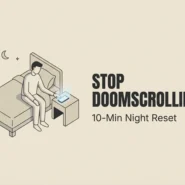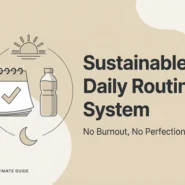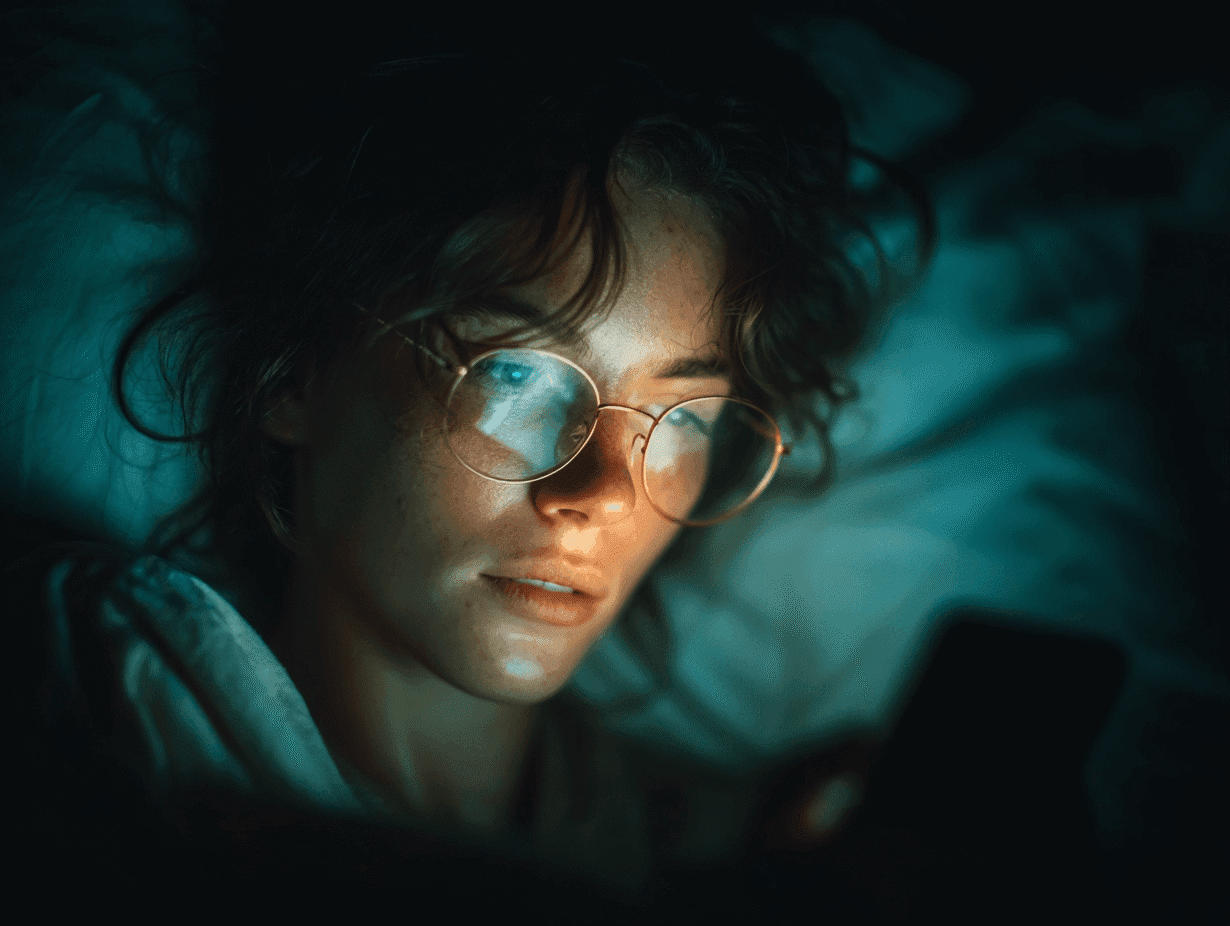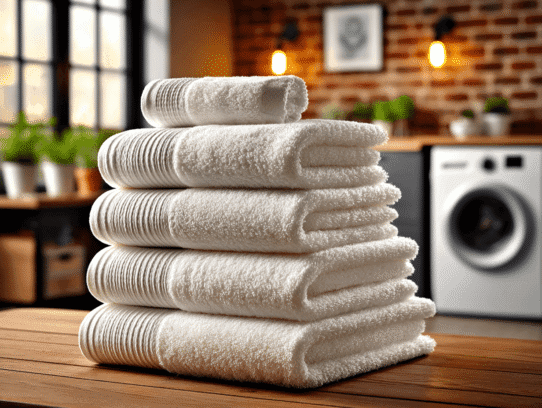Ever found yourself in bed, lights down, and scrolling for just a few minutes? But then, 30 minutes have passed? You’re not alone. This habit of using phones and other electronic devices at night has become increasingly common. But is it really harmless? Could digital device usage and sleep patterns be more closely linked than we realize?
Today, we explore research on how screen time affects sleep quality. You might be surprised by what you learn about the relationship between phones and sleep, and the side effects of using your phone at night.
🔍 The Big Picture: How Screens Impact Your Sleep
A study in Frontiers in Psychiatry looked at over 45,000 Norwegian students to understand how screen time before bed affects sleep. The findings shed light on the connection between screen time and insomnia symptoms, as well as overall sleep quality.
The study found that using electronic devices before bed increases insomnia symptoms and reduces sleep duration. In fact, using screens before bed raises your chance of experiencing insomnia by 59%. Scrolling before bed can cut your sleep by 24 minutes – that’s nearly 3 hours a week of potential sleep debt. This sleep deficiency can harm your mood, cognitive functioning, and health over time.
The large scale of this study makes its findings on how screen time affects sleep particularly reliable. They suggest that many people, not just students, might be affected by their digital device usage and sleep patterns.
💻 The Surprising Truth: All Screen Activities Affect Sleep Similarly
When considering screen time effects on adults, many think of social media first. But what screen activities truly disrupt sleep? The study looked at different types of screen time, including social media use, watching movies, and gaming.
They found something surprising about screen time before bed research. The type of screen activity didn’t significantly change how it affected sleep. Social media impact on sleep wasn’t worse than other activities. Whether it was watching TV before bed or reading on a laptop, the effects on sleep quality were similar. This challenges the idea that social media use is uniquely bad for sleep.
What mattered most was how long you used screens before bed. The time spent on electronic devices after getting into bed was the strongest predictor of sleep problems and reduced sleep efficiency.
⏰ Why Screen Time Steals Your Sleep
Using screens before bed can disrupt your sleep-wake cycle. But it’s not just about blue light exposure. It’s about the time you spend on screens instead of sleeping, creating a sleep deficiency.
When you’re scrolling in bed, you’re choosing screen time over sleep. This time displacement effect is a big factor in sleep quality and duration. It’s like staying at a party too long when you need to sleep early. The problem isn’t what you’re doing, but that you’re not getting to bed, potentially leading to daytime tiredness.
Blue light from electronic devices and stimulating content can also keep your brain active, affecting melatonin production. But the main issue is losing sleep time to screens, impacting your overall sleep hygiene.
😲 The Unexpected Twist: Social Media Users Slept Better?
The research took a surprising turn when examining the effects of social media use on sleep. It found that students who only used social media before bed actually had fewer insomnia symptoms and slept longer than those who engaged in other screen activities or mixed activities.
Wait, what? Doesn’t that contradict everything we thought we knew about social media and sleep deprivation?
The researchers proposed several possible explanations for this counter-intuitive finding:
- For some people, connecting with others online before bed might actually help them feel more relaxed and satisfied, potentially improving sleep quality.
- Students who already struggle with sleep problems might intentionally avoid social media before bed, believing it worsens their sleep.
- Some students might use activities like watching videos or listening to sleep stories to help them unwind or fall asleep, which could have different effects than social media use.
While this finding challenges conventional wisdom about social media impact on sleep, it’s important to note that screen time overall was still associated with worse sleep—even for social media users. The social media group just fared slightly better than the others in terms of sleep duration and efficiency.
🛌 Simple Changes for Better Sleep Tonight
Here are some easy tips to limit screen time before bed and improve your sleep hygiene:
- Create a screen-free buffer zone before bed. Stay away from screens for 30-60 minutes before sleep. This helps your brain relax and prepares you for better sleep quality.
- Turn off notifications as bedtime nears. Those alerts can keep you awake and alert, disrupting your circadian rhythm.
- Start a calming bedtime routine without screens. Try reading a physical book, stretching, journaling, or quiet reflection. Some find white noise or progressive muscle relaxation helpful.
- Keep your smartphone and other electronic devices in another room at night. This stops you from checking them when you should be sleeping, reducing sleep interruptions.
- Use a traditional alarm clock instead of your phone’s alarm. This helps avoid the temptation to keep your phone nearby and engage in late-night smartphone use.
These small changes can greatly improve your sleep quality and reduce sleep latency (the time it takes to fall asleep).
🤔 Important Considerations About the Research
Remember these points when looking at the study’s findings on screen time before bed research:
The study focused on university students in Norway aged 18-28. The results might not fit everyone, including different ages or cultures.
The study found a link between screen use and sleep issues. But it doesn’t prove screens cause sleep problems. People who struggle with insomnia might use screens more as a result.
Participants reported their screen and sleep habits. This data relies on their memory and perception. We often underestimate our screen time and its impact on our sleep-wake cycle.
The study grouped screen activities broadly. This might hide how different types of content affect sleep. For example, a calming documentary might be different from a thriller in terms of sleep quality and cognitive functioning.
💡Final Thoughts: Small Changes, Big Results
The link between screens and sleep is complex. Yet, this study shows a key point: screen time before bed impacts sleep quality and duration.
Instead of quitting screens cold turkey, aim for a screen-free buffer before bedtime. A 30-60 minute break before bed can really help your sleep. This aligns with recommendations on when to stop screen time before bed for optimal sleep hygiene.
Try this tonight: move your phone to another room or keep it far from your bed an hour before sleep. Instead, read a real book, write in a journal, or just relax and practice mindfulness. See how you feel in the morning. You might be amazed at the impact of this small change on your sleep efficiency.
For those who find it challenging to disconnect, consider using blue light blocking glasses or activating nighttime mode on your devices. Some find sleep medication helpful, but it’s best to consult with a healthcare professional before use.
Remember, good sleep hygiene isn’t just about avoiding screens. Creating a relaxing environment with dim lighting and a consistent bedtime routine can also contribute to better sleep quality.
Sweet dreams!
Source: Research published in Frontiers in Psychiatry Website: https://www.frontiersin.org/journals/psychiatry/articles/10.3389/fpsyt.2025.1548273/full








